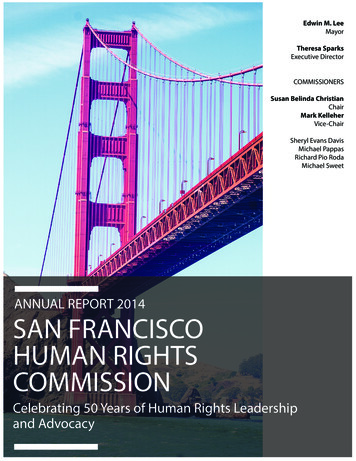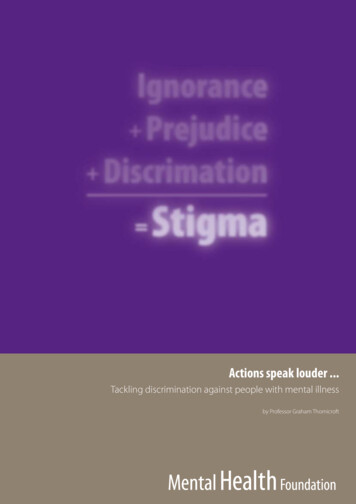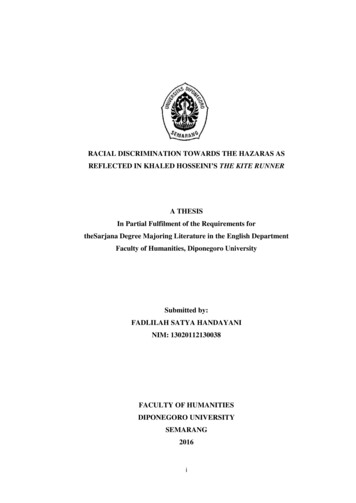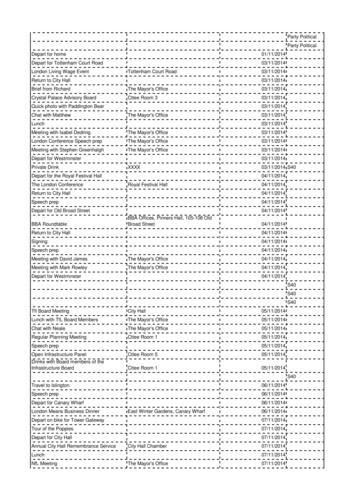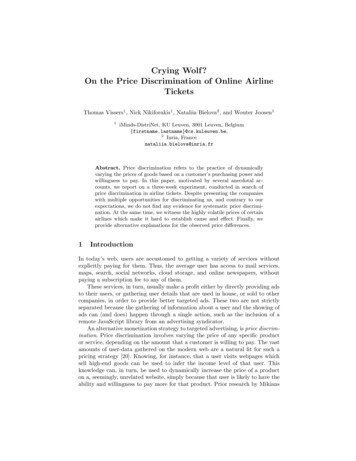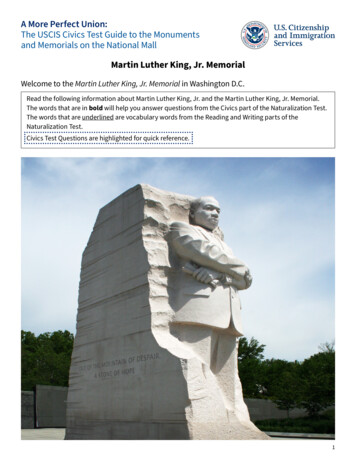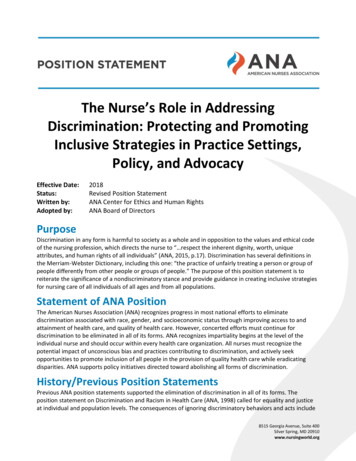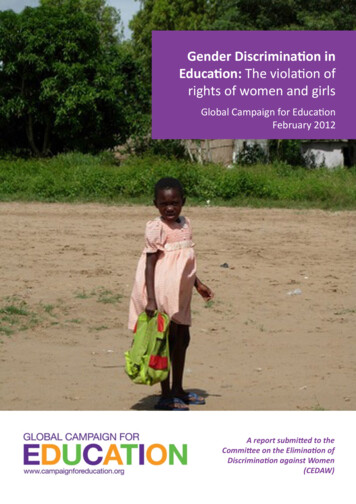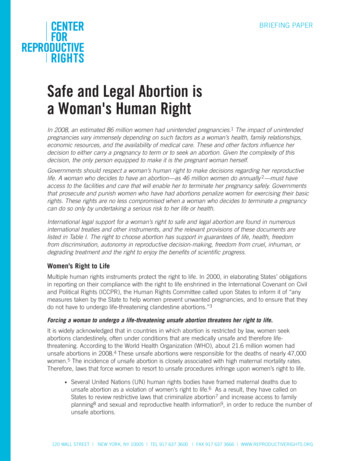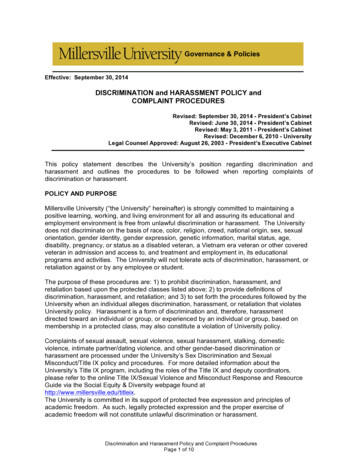
Transcription
Governance & PoliciesEffective: September 30, 2014DISCRIMINATION and HARASSMENT POLICY andCOMPLAINT PROCEDURESRevised: September 30, 2014 - President’s CabinetRevised: June 30, 2014 - President’s CabinetRevised: May 3, 2011 - President’s CabinetRevised: December 6, 2010 - UniversityLegal Counsel Approved: August 26, 2003 - President’s Executive CabinetThis policy statement describes the University’s position regarding discrimination andharassment and outlines the procedures to be followed when reporting complaints ofdiscrimination or harassment.POLICY AND PURPOSEMillersville University (“the University” hereinafter) is strongly committed to maintaining apositive learning, working, and living environment for all and assuring its educational andemployment environment is free from unlawful discrimination or harassment. The Universitydoes not discriminate on the basis of race, color, religion, creed, national origin, sex, sexualorientation, gender identity, gender expression, genetic information, marital status, age,disability, pregnancy, or status as a disabled veteran, a Vietnam era veteran or other coveredveteran in admission and access to, and treatment and employment in, its educationalprograms and activities. The University will not tolerate acts of discrimination, harassment, orretaliation against or by any employee or student.The purpose of these procedures are: 1) to prohibit discrimination, harassment, andretaliation based upon the protected classes listed above; 2) to provide definitions ofdiscrimination, harassment, and retaliation; and 3) to set forth the procedures followed by theUniversity when an individual alleges discrimination, harassment, or retaliation that violatesUniversity policy. Harassment is a form of discrimination and, therefore, harassmentdirected toward an individual or group, or experienced by an individual or group, based onmembership in a protected class, may also constitute a violation of University policy.Complaints of sexual assault, sexual violence, sexual harassment, stalking, domesticviolence, intimate partner/dating violence, and other gender-based discrimination orharassment are processed under the University’s Sex Discrimination and SexualMisconduct/Title IX policy and procedures. For more detailed information about theUniversity’s Title IX program, including the roles of the Title IX and deputy coordinators,please refer to the online Title IX/Sexual Violence and Misconduct Response and ResourceGuide via the Social Equity & Diversity webpage found athttp://www.millersville.edu/titleix.The University is committed in its support of protected free expression and principles ofacademic freedom. As such, legally protected expression and the proper exercise ofacademic freedom will not constitute unlawful discrimination or harassment.Discrimination and Harassment Policy and Complaint ProceduresPage 1 of 10
SCOPEThis policy and procedure applies to and covers all areas of University operations, programs,sites, and includes the conduct of employees, students, visitors/third parties, and applicants.Any individual (i.e., person, visitor, student, faculty, staff, administrator, or applicant) may seekinformation about unlawful discrimination or harassment or file an informal or formal complaint.Any individual may contact the Title IX Coordinator and/or the Director of Human Resources(DHR) directly for informal discussion, advice, and assistance. The Title IX Coordinator andOffice of Human Resources (HR) are designated as the offices of referral for information,advice, assistance, and resolution. No other person other than those specifically designatedmay conduct an official investigation of discrimination or harassment. Complaints involvingsame-sex instances are covered under this policy – gender is not an issue.In any incident where the respondent is a University student, the complaint will be processedthrough the Office of Judicial Affairs under the procedures established within the JudicialAffairs Handbook.DEFINITIONSComplaint/Incident Report: a detailed written statement of allegations of unlawful orprohibited discrimination or harassment that is signed and dated by the complainant.Complaints submitted electronically or in writing are permissible under these procedures.Complainant: the complainant is the individual (i.e., student, employee, applicant, person,or visitor) who makes allegations that prohibited discrimination or harassment has occurred.Discrimination: consists of three generally acknowledged forms: 1) unlawful discrimination,2) unlawful harassment, and 3) retaliation. “Discrimination” in general and for the purposes ofthis procedures, is defined as an adverse employment or academic action or decision that isbased on or motivated by an individual’s protected class status that is sufficiently severe,persistent or pervasive so as to have the effect of substantially limiting or interfering with one’semployment or educational performance or creating an intimidating, hostile, or offensiveemployment or educational environment.Harassment: whether verbal, physical, or visual, that is based on any of the protectedclasses is discriminatory. This includes harassing conduct affecting job benefits, interferingunreasonably with an individual's work performance, or creating what a reasonable personwould consider to be intimidating, hostile, or offensive environment. Harassment is defined asany type of conduct directed at an individual based on his or her protected class status that issufficiently severe, persistent, or pervasive that it substantially interferes with an individual'swork environment, educational performance, participation in extra-curricular activities, orequal access to the University's resources and opportunities.Investigation: is a systematic collection of all reasonably ascertainable and relevant facts ina fair and objective manner. An assigned Investigative Team conducts an investigation,including investigatory interviews of witnesses, the employee or student making the complaintand the employee or student respondent. The Investigative Team prepares an investigativefact-finding report at the conclusion of the investigation. Generally, the Investigative Team willconsist of the Title IX Coordinator and DHR, however, depending on the circumstances of thecomplaint alternative individuals may be assigned to conduct an investigation of a complaint.Discrimination and Harassment Policy and Complaint ProceduresPage 2 of 10
Investigative Team: generally, will consist of the Title IX Coordinator and DHR. Undercertain circumstances, it may be appropriate to have other individual(s) to conduct a formalinvestigation. Investigators will have relevant and continuous training, qualifications, andexperience.Mediation: is a voluntary, informal resolution process in which the parties in a disputeagree to work through and resolve the dispute with the assistance of a neutral, third- partymediator(s).Pre-Disciplinary Conference: is a meeting scheduled to afford an employee anopportunity to provide relevant information regarding employment matters that may resultin disciplinary action against an employee.Protected Classes: are groups of people who share common characteristics and areprotected by law from discrimination and harassment. Protected classes include race, color,religion, creed, national origin, sex, sexual orientation, gender identity, gender expression,genetic information, marital status, age, disability, pregnancy, or status as a disabled veteran,a Vietnam era veteran or other covered veteran.Respondent: is the individual against whom allegations of discrimination, harassment, orretaliation have been made.Retaliation: occurs when a student or employee is subjected to adverse action inresponse to that individual expressing concern about discrimination or harassment orparticipating in the opposition or resolution of a complaint involving discrimination orharassment. See page 5 for policy on retaliation.REPORTING DUTIES AND RESPONSIBILITIESAny individual (e.g., person, visitor, student, faculty, staff, administrator, or applicant) who ismade aware of an incident or receives a report of discrimination or harassment should referthe person directly to the Title IX Coordinator or DHR for assistance immediately. The TitleIX Coordinator and DHR are designated as the contacts for referral, information, advice,assistance, and resolution. No other person other than those specifically designated by theTitle IX Coordinator or DHR may conduct an investigation.Any individual receiving a report of discrimination or harassment is required to contact theTitle IX Coordinator, or the DHR, or any manager, supervisor or other designated employeelisted in the University Resources section (Section 8) of this policy. If the person to whomthe discrimination or harassment normally would be reported is the individual accused ofthe discrimination or harassment, complaints should be made to another manager,supervisor, or designated resource person. This person shall in turn ensure promptnotification to the Title IX Coordinator and/or DHR. Reports of discrimination or harassmentshould be brought as soon as possible after the alleged conduct occurs. The Title IXCoordinator and/or DHR are designated as the persons of referral for information, advice,assistance, and resolution. No other person other than those specifically designated mayconduct an official investigation of discrimination or harassment.Supervisor/Manager Obligation to ReportAny supervisor/manager who witnesses or receives a written or oral complaint ofdiscrimination, harassment, or retaliation that occurs in University employment and/orDiscrimination and Harassment Policy and Complaint ProceduresPage 3 of 10
educational programs and activities, are required to promptly report it to the Title IXCoordinator and/or DHR. A failure to report discriminatory or retaliatory activities mayconstitute a policy violation. This requirement does not obligate a supervisor to keepcertain communications confidential as mandated by law.General Obligation to ReportIn order to take appropriate and prompt corrective action, the University must be aware ofthe alleged discrimination, harassment, or retaliation that occurs in University employmentand educational programs and activities. A person who experiences or witnessesdiscrimination, harassment, or retaliation, should promptly report the information to the TitleIX Coordinator and/or DHR.GENERAL COMPLAINT PROVISIONSAssistance for Complainants and RespondentsIt is the University’s policy to recognize and respect the rights of any individual against whom acomplaint has been filed. All students and employees enjoy procedural due process rightswhich include notice and the opportunity to be heard. If applicable, employees accused ofdiscrimination or harassment shall have the right to be assisted by their collective bargainingunit representative at any meeting held to discuss the complaint.ConfidentialityGood faith efforts shall be made, to the extent possible, to protect the privacy of thoseinvolved in the filing and investigation of a complaint. The University, however, is not able toguarantee absolute confidentiality. In recognition of the dignity and reputation of allindividuals, the University’s intent is to preserve the confidentiality of the complaint during itsinvestigation. Disclosure of the complaint will be limited to individuals who, in the interest offairness and resolution, are involved in the investigation. The University will take reasonablemeasures to protect the confidentiality of the testimony and records produced during aninvestigation conducted pursuant to this policy. The complainant and respondent are stronglyencouraged to maintain confidentiality. The following steps should be taken to help assureconfidentiality:1. The number of persons with knowledge of the complaint shall be kept to a minimum.Only persons with a need to know shall be notified of the complaint;2. The Title IX Coordinator or HR shall exercise discretion in the setting of dates andlocations of interviews, and the placing of, and responding to, telephone calls andwritten correspondence related to the complaint; and3. The Investigative Team will interview, in person, individuals named as witnesses by thecomplainant and respondent to the extent possible. Solicitation of comments from others,unless there is reason to believe they have relevant, first-hand knowledge about thecomplaint, will be avoided.Interference/False AccusationsAny person who attempts to interfere with any individual pursuing a discrimination orharassment complaint or concern may be subject to disciplinary action. Discrimination andharassment are serious matters that can impact and have far-reaching effects on thecareers and lives of individuals. Therefore, knowingly making a material misstatement offact may also result in corrective or disciplinary action.Discrimination and Harassment Policy and Complaint ProceduresPage 4 of 10
Anyone who believes that he or she has been the subject of a false complaint of discriminationor harassment may meet with the Title IX Coordinator to discuss the allegations. The filing of acomplaint that results in a finding of no policy violation is not sufficient evidence of the intent tofile a false complaint.Retaliation ProhibitedThe University prohibits retaliation against individuals who, in good faith, assert their rightsto bring a complaint of discrimination or harassment. Retaliation against any person forreporting or complaining of discrimination or harassment, assisting or participating in theinvestigation of a complaint of discrimination or harassment, or enforcing Universitypolicies with respect to discrimination or harassment is strictly prohibited. Overt or covertacts of reprisal, interference, restraint, discrimination, intimidation, or harassment againstan individual or group for exercising rights or performing duties under these procedureswill be subject to appropriate and prompt corrective or disciplinary action.Retaliation, if found to have occurred, is considered an offense separate from the originalcomplaint of discrimination or harassment, and will be considered independently from themerits of the underlying complaint. Individuals who believe they have been subjected toretaliation should report the conduct to the Title IX Coordinator and/or DHR as promptly aspossible.INFORMAL AND FORMAL COMPLAINT PROCEDURESPre-Complaint Review (Informal Process)The purpose of the pre-complaint review is to provide an individual an opportunity todiscuss privately the specifics of the complaint and to receive guidance and information onthe administrative procedures followed by the Title IX Coordinator – in the event a complaintis to be filed. Complaints filed pursuant to these procedures will be addressed and resolvedas promptly and as practicable after the complaint is made.It shall be the responsibility of the Title IX Coordinator to promptly determine whether thecomplaint is properly classified as a possible instance of discrimination or harassment basedon the complainant’s protected class status. If not properly classified, the Title IXCoordinator shall communicate such and may attempt other resolution strategies on behalf ofthe complainant. After receiving information or pre-complaint counseling, an individual may:1. Choose not to pursue a complaint; or2. Decide to take action directly with the respondent by verbally or in writing requesting theindividual to cease the alleged misconduct; or3. Report the matter to the respondent's supervisor or department head asking that stepsbe taken to ensure that the alleged misconduct ceases; or4. Ask the Title IX Coordinator to pursue informal or formal resolution of the matter toensure the alleged misconduct ceases.Discrimination and Harassment Policy and Complaint ProceduresPage 5 of 10
Informal ProcessInformal review and consultative processes are highly desirable means for resolvingdiscrimination or harassment complaints. The purpose of informal complaint resolution is toencourage the reporting of complaints concerning discrimination or harassment and tofacilitate satisfactory resolution of the complaint. A complainant may choose to pursue theformal complaint resolution process anytime during the informal review process.The Title IX Coordinator shall decide whether a complaint warrants an attempt at informal orformal resolution by determining whether or not the facts of the complaint, even if found to betrue, would constitute a policy violation. In some cases, a formal investigation may beappropriate and must be pursued to protect all individuals to the complaint.The respondent may be told of the identity of the complainant at this stage. Investigation isoptional, since the emphasis is not on establishing guilt or innocence, but on stopping thealleged misconduct.If deemed appropriate under certain circumstances, the Title IX Coordinator and DHR maymeet with the complainant and respondent together if, in their judgment, such a meeting couldfoster a resolution to the issues and the complainant and respondent agree to such a meeting.If the identity of a complainant is known and if the Title IX Coordinator has not been involvedin the resolution, the Title IX Coordinator shall make follow-up contact with the appropriatemanager or supervisor within a reasonable period of time to ascertain whether the matter hasbeen resolved, ensure completion of proper documentation, and proceed to close its file uponresolution.Informal complaint resolution may be achieved by any of the following steps:1. Action taken by the complainant to address the matter directly with the respondent; or2. Action to negotiate a resolution taken by the respondent's supervisor or departmenthead, after consultation with the Title IX Coordinator and/or DHR upon the request of thecomplainant.3. With the agreement of the complainant and respondent, action to negotiate a resolutionthrough a form of alternative dispute resolution (e.g., mediation) facilitated through theUniversity Mediation Program:a. The Title IX Coordinator may designate other individuals to facilitate an alternativedispute resolution process. Mediators shall be certified and have relevant training,qualifications, and experience. Anyone designated to mediate a complaint must adhereto the appropriate procedures and confer with the Title IX Coordinator and/or DHRthroughout the process.b. If mediated, the mediators will help the complainant and respondent to identify,clarify, discuss, and resolve their issues, eventually guiding them toward aninformed, mutual agreement. This agreement will be filed with the Title IXCoordinator.c. Should this mediation not resolve the issues to the satisfaction of the complainant, he orshe may file a formal complaint, in writing, within ten (10) business days with the Title IXDiscrimination and Harassment Policy and Complaint ProceduresPage 6 of 10
Coordinator. If appropriate, an Investigative Team shall conduct a formal investigation.If at the any point during the informal process, it is determined that a formal investigation is tobe conducted, the complainant and respondent shall have the right to present relevantinformation to the Investigative Team and to receive, at the conclusion of the investigation andappropriate review, a notification of outcome, to the extent permitted by law.Formal ProcessFiling a Formal ComplaintTo initiate a formal complaint, the complainant should submit a completed and signedComplaint Form. The complainant should be able to document the following:1. State a complaint based upon one's membership in a protected class;2. The date of the alleged offense with as much specificity as possible;3. Impact that the discriminatory or harassing conduct has had on the employment oreducational environment, and;4. Specify the desired outcome the complainant is seeking as a result of the complaint.Notice of Receipt of a Formal ComplaintAfter receipt of a completed Complaint Form, the Title IX Coordinator shall meet with thecomplainant(s) as soon as possible, generally no later than seven (7) business days afterreceiving the complaint, if needed. The purpose of this meeting is to review the complaintand clarify any issues, which may be unclear.Notice of the Filing of a Formal Complaint to the RespondentThe official letter of notice to a complainant(s) and respondent(s) of a filing of a formalcomplaint of discrimination or harassment is referred to as the Notice of Complaint. TheNotice of Complaint will be served either personally, by regular mail or by certified mail. TheNotice of Complaint will include the complainants name and the allegation(s) made.InvestigationGenerally, the Investigative Team will consist of the Title IX Coordinator and DHR,however, depending on the circumstances of the complaint alternative individualsmay be assigned to conduct an investigation of a complaint. The Investigation Teamwill then review and investigate the complaint, interview the parties to it, as well asany relevant witnesses and persons having knowledge of the situation. Both partiesmay suggest witnesses and other evidence for consideration. The InvestigationTeam may meet as frequently as necessary to complete the investigation. Allinterviews, meetings, telephone calls and other activities relating to the complaint willbe carefully documented and clearly dated by the Investigation Team. During thisprocess both the complainant and the respondent may be accompanied by anadvocate whose role will be advisory only; advocates will not address theInvestigation Team directly.The fact-finding process is intended to be an internal investigation, not an adjudicatoryprocess; therefore, the strict rules of evidence and criminal or civil procedure applicable in theexternal legal system do not apply.Discrimination and Harassment Policy and Complaint ProceduresPage 7 of 10
After the Investigation Team has declared that the investigation is complete, they willprepare a written report which shall include the following:1. A statement of the findings of fact;2. A statement of the conclusions, if any, which they have drawn;3. Any other relevant information deemed appropriate to the findings of fact.The report will be completed and sent to the University President or his or her designee, within14 working days of the conclusion of the investigation. Upon receiving the report from theInvestigation Team, the President, or his or her designee, will review it and determine aresolution. The final decision as to the outcome of the investigation and what, if any, action tobe taken shall be the President’s, or his or her designee. The President, or his or herdesignee, shall have absolute discretion to accept or reject the findings and/or conclusions inthe report in whole or in part, and shall have the authority to seek additional information as sheor he deems appropriate. Any resolution by the President, or his or her designee, will bedetermined after she or he has conducted any required pre-disciplinary hearing. If the decisionis unfavorable to the respondent, the President, or his or her designee, may take disciplinaryaction against him or her. Possible sanctions include, but are not limited to, written or oralreprimand, demotion, suspension, leave of absence without pay, temporary or permanentdebarment from University functions, activities and memberships, or termination from theUniversity. The President, Vice President, or his/her designee will inform the complainant andthe respondent of his/her decision in writing within 30 business days of receipt of theInvestigation Team’s report.Notice of OutcomeAfter the conclusion of an investigation and determination of a finding, the President, VicePresident, or his or her designee shall issue an official notice of outcome letter to both thecomplainant and respondent, generally no later than seven (7) business days after theinvestigations conclusion, and notice of any change in results when they become final.AppealsIf the complainant finds the resolution or administrative action unsatisfactory, he or she mayfile an appeal with the University President or his or her designee within five (5) days of beingadvised of the outcome of the investigation.RELATED PROCEDURESSuspension or Withdrawal of ComplaintsThe University may suspend its investigation at any stage if the Investigative Teamreceives a written resolution of the complaint agreed to by both the complainant andrespondent.A complaint may be withdrawn at any time upon receipt of a written request from thecomplainant. The respondent will be notified of the withdrawal of the complaint. If acomplainant files a complaint with an external enforcement agency or state or federalcourt, the Investigative Team may cease to process the complaint internally and defer thecomplaint to the appropriate state or federal agency or court.Discrimination and Harassment Policy and Complaint ProceduresPage 8 of 10
Dismissal of ComplaintsA complaint may be dismissed if the designated Investigative Team determines thatdiscrimination, harassment, or retaliation has not occurred.A complaint may be dismissed if the Investigative Team determines that the complainant hasnot cooperated and the action or actions of the complainant impairs or compromises theInvestigative Team’s ability to conduct an objective investigation. In such instances, whereapplicable, the Investigative Team may cease its investigation.Willful false allegations by complainants or abuse of this process may result in actions andsanctions, including reprimand, suspension, demotion, or dismissal.RESOURCESCounseling for University Students and EmployeesCounseling and support services are made available to any student or employee who believesthat he or she has been subjected to any form of discrimination or harassment. Students mayavail themselves to counseling services through the Center for Counseling& HumanDevelopment (717) 872-3122. Employee counseling services are available through the StateEmployee Assistance Program (SEAP) at 1-800-436-2301 or online at www.liveandwork.com Access Code: Pennsylvania.Campus ResourcesThe following University resources are available to all members of the University communitywho seek information about University policies on equal employment opportunity, standards ofconduct, informal and formal mechanisms for resolving complaints, and resources forcomplainants and respondents. However, the Title IX Coordinator and/or the DHR must becontacted in order to commence either a formal or an informal process to any allegedcomplaints. These resources for informational purposes include, but are not limited to thefollowing:CAMPUS RESOURCESLOCATIONPHONEPresident’s OfficeBiemesderfer Executive Center(717) 872-3591Title IX CoordinatorBiemesderfer Executive Center(717) 871-4100Director of Human Resources (DHR)Dilworth Building(717) 872-3017Biemesderfer Executive Center(717) 872-3596Duncan Alumni House(717) 872-3775Lyle Hall(717) 871-2250Dilworth Building(717) 872-3043Vice President for Student AffairsStudent Memorial Center(717) 872-3594Dean, School of EducationStayer Education Center(717) 872-3379Provost and Vice President forAcademic AffairsVice President for Development &Alumni RelationsVice President for EnrollmentManagementVice President for Finance &AdministrationDiscrimination and Harassment Policy and Complaint ProceduresPage 9 of 10
Dean, School of Humanities & SocialSciencesDean, School of Science &MathematicsDean, College of Graduate andProfessional StudiesMcComsey Hall(717) 872-3553Caputo Hall(717) 872-3407Lyle Hall(717) 872-3099Director, Office of Judicial AffairsStudent Memorial Center(717) 871-5841Office of the ChancellorDixon University Center2986 N. 2nd St.Harrisburg, PA 17110(717) 720-4010External Enforcement AgenciesAn individual who files a complaint alleging discrimination, harassment or retaliation, has theoption of pursuing external enforcement. At any time during the complaint process,a complainant may choose to file a complaint with a court or external public agencyresponsible for enforcing the laws against discrimination and harassment, such as:Equal Employment Opportunity Commission (EEOC) (800) 669-4000EEOC Philadelphia District Office801 Market Street, Suite 1300Philadelphia, PA 19107-3127www.eeoc.govOffice for Civil Rights (OCR), U.S. Department of Education (215) 656-8541OCR Philadelphia Office, The Wanamaker Building100 Penn Square East, Suite 515Philadelphia, PA 19107-3323 www2.ed.govPennsylvania Human Relations Commission (PHRC) (717) 787-9780PHRC Harrisburg Regional Office, Riverfront Office Center, 5th Floor1101-1125 S. Front StreetHarrisburg, PA 17104-2515 www.phrc.state.pa.usPREVENTION AND EDUCATIONThe prevention of discrimination, harassment, retaliation, and the establishment of effectiveprocedures with due concern for everyone involved requires a comprehensive educationalplan. The University provides information concerning; a) definitions of harassment,discrimination, and retaliation; b) examples of incidents of discrimination or harassment; c)sources of support and information for complainants and respondents; and d) mediation andresolution resources. Faculty, staff, administrators, and students must share jointresponsibility for creating and maintaining an environment free from discrimination andharassment; therefore, the University provides an online harassment prevention tutorial whichcan be accessed by visiting the SED webpage found ville. Vice Presidents, Deans, Directors,Managers/Supervisors and/or Department Chairs are required to discuss these proceduresand issues with students, faculty, and staff annually.Discrimination and Harassment Policy and Complaint ProceduresPage 10 of 10
Revised: December 6, 2010 - University Legal Counsel Approved: August 26, 2003 - President's Executive Cabinet This policy statement describes the University's position regarding discrimination and harassment and outlines the procedures to be followed when reporting complaints of discrimination or harassment.

